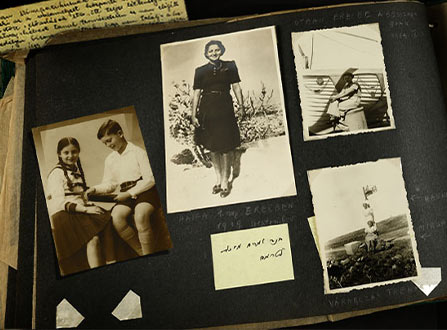Hannah Szenes
Hannah Szenes (1921–1944) was a Jewish soldier and a poet. She was born in Hungary and immigrated to what was then Mandatory Palestine in 1939, where she eventually became one of the founders of Kibbutz Sdot Yam. In 1943, during World War II, at the height of the extermination of European Jewry, she volunteered for the British Army and set out to parachute behind enemy lines in Europe. While crossing the border into her native Hungary, 23 year-old Szenes (often spelled Szenes) was captured by Hungarian forces, allied with Nazi Germany. She was executed shortly after. Her poems, diaries and letters published after her death established her as a national heroine in Israeli collective memory. The rich archive of her collected writings was deposited at the National Library of Israel in 2021.
Hannah Szenes was born in Budapest on July 17, 1921 to an educated family. Her father, a journalist, playwright and author, died when Hannah was six years old. Toward the end of her high school studies in Hungary Szenes experienced antisemitism and harsh restrictions imposed on Jews on the eve of the Second World War. She made the decision to immigrate to the Land of Israel and take an active part in the Zionist enterprise. She arrived in 1939 and underwent two years of training at the Nahalal Agricultural School for Girls, after which she joined the group establishing Kibbutz Sdot Yam. She worked in agriculture, and was a counselor for the Working and Studying Youth (HaNoar HaOved VeHaLomed), and at the same time, she wrote poetry as well as a play about life on the kibbutz.
Her embrace of Zionism and immigration did not diminish her concern over what was happening in Europe, and in particular, in her native Hungary. Szenes felt an urgent need to enlist in the struggle against Nazi Germany and its allies, and in 1943 she volunteered for the British Army. Her background, courage and determination made her a suitable candidate for one the most dangerous secret initiatives undertaken by British forces and the Jewish community in Palestine: the parachuting of fighters behind enemy lines in Europe, for the sake of gathering intelligence and helping to rescue Allied pilots who had been forced to abandon their planes. The mission also aimed to make contact with the partisans and anti-Nazi underground, while trying to help save Jews. For Szenes, the Nazi threat against Hungarian Jewry was the main motive for volunteering for the dangerous operation.
In March 1944, Hannah Szenes (whose code name was “Hagar”), Reuven Dafni, Yona Rosen and Abba Berdichev parachuted into Yugoslavia, near the Hungarian border. The paratroopers worked with local partisans in Croatian territory, and in June 1944 Szenes crossed the border into Hungary. Hungarian soldiers patrolling the borders quickly apprehended her and she was transferred to Budapest for interrogation. Though severely tortured, she refused to divulge any details about the mission or her comrades in the covert operation. Szenes was prosecuted as a British spy, and because she was also a native of Hungary, for treason as well. In November 1944, before the legal proceedings concluded, 23- year-old Szenes was executed in a Budapest prison.








